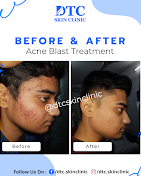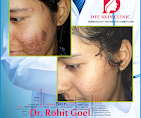Acne, a common skin condition affecting millions worldwide, manifests in various forms, from mild breakouts to severe cysts. Understanding its symptoms, causes, and available treatments is crucial for effective management.
Symptoms of Acne
Acne typically appears as:
- Pimples: Red, swollen bumps often containing pus.
- Blackheads and Whiteheads: Clogged pores with oxidized oil (blackheads) or closed pores (whiteheads).
- Papules and Pustules: Small, red bumps or pimples with pus at the tip.
- Nodules: Painful, solid lumps beneath the skin.
- Cysts: Deep, pus-filled lumps causing pain and scarring.
Symptoms can vary in severity and location, commonly affecting the face, chest, back, and shoulders.
Causes of Acne
Several factors contribute to acne formation:
- Excess Oil Production: Overproduction of oil (sebum) by the skin’s sebaceous glands.
- Clogged Pores: Buildup of dead skin cells and bacteria in hair follicles.
- Bacterial Infection: Propionibacterium acnes (P. acnes) bacteria within hair follicles.
- Hormonal Changes: Fluctuations during puberty, menstrual cycles, or hormonal imbalances.
- Genetics: Family history of acne can increase susceptibility.
- Dietary Factors: Certain foods and high-glycemic diets may exacerbate acne.
- Stress: Emotional stress can worsen existing acne.
Treatment of Acne
Effective acne treatment aims to reduce oil production, prevent bacterial buildup, and promote skin cell turnover. Treatment options include:
- Topical Treatments: Creams, gels, or lotions containing benzoyl peroxide, salicylic acid, or retinoids to unclog pores and reduce inflammation.
- Oral Medications: Antibiotics (e.g., tetracycline) or hormonal therapies (e.g., birth control pills) for moderate to severe acne.
- Therapeutic Procedures: Dermatological procedures like chemical peels, microdermabrasion, or laser therapy to reduce acne and acne scars.
- Lifestyle Adjustments: Proper skincare regimen, avoiding pore-clogging products, and managing stress.
- Home Remedies: Natural treatments like tea tree oil or aloe vera for mild acne symptoms.
Seeking Professional Advice
For persistent or severe acne, consulting a dermatologist is recommended. They can tailor a treatment plan based on the type and severity of acne, ensuring effective management and minimizing potential scarring.
Explore our comprehensive range of acne treatment options to start your journey towards clearer, healthier skin. Contact us today to schedule a consultation and discover personalized solutions for your skincare needs.
Acne Treatment, Your Partner for Clearer Skin.





